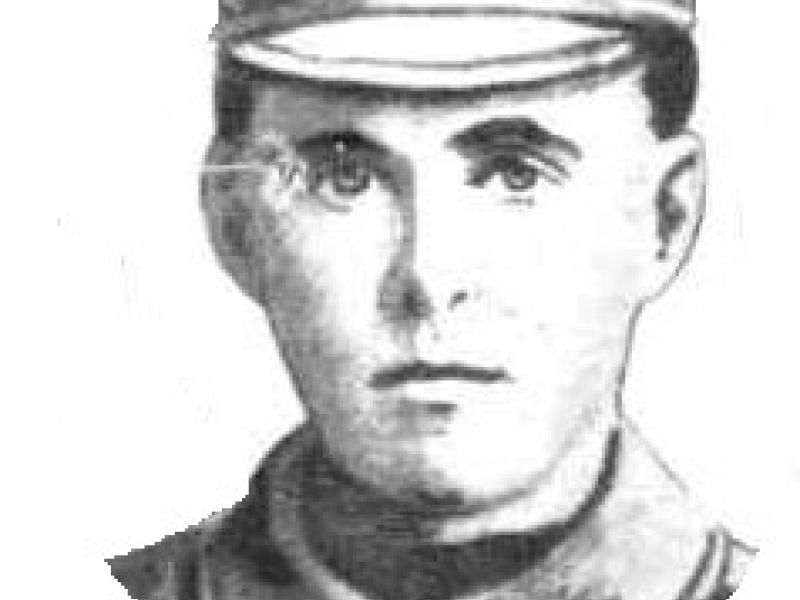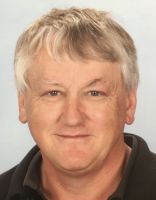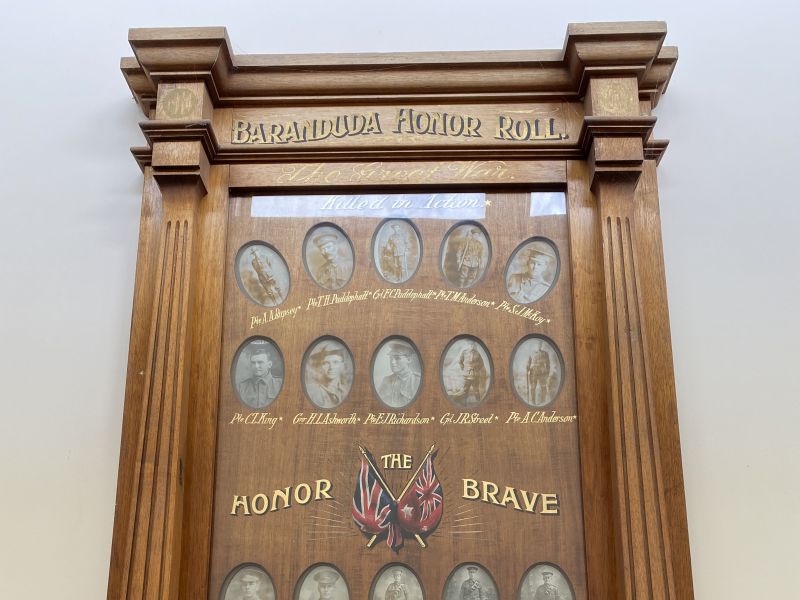Stanley James McKoy
Stanley was born in 1889 at Frankston, Victoria. He would be the fifth of eight children for John Henry and Helena Meara Lena (née Henrichs) McKoy. The family would develop its roots in the Wodonga area, becoming well known and well regarded in the region.
He enlisted in Sydney on the 16th of September, 1914, being allocated the Regimental Number 991 in F Company of the 13th Infantry Battalion of the 4th Brigade. In a case the same as Ernie Edmondson (see May 1), the only information written on Stanley’s B-103 form is the date of his death, so we have no information on his time in the army other than his letters and diary entries. Stanley’s younger brother, Augustus, enlisted the day before and placed in the same company as Stanley. Augustus would return to Australia suffering from toxic myocarditis (inflamation of the heart muscle) on the 27th of July, 1917.
The 4th Brigade, under the command of Colonel John Monash, embarked for overseas in late December, arriving in Egypt in early February the following year. As Australia already had an AIF division in Egypt, the 4th Brigade became part of the New Zealand and Australian Division.
Stanley was a regular writer to his family back home in Australia, sp his story is best told in his own words. On the 30th of April, 1915, the Wodonga and Towong Sentinel published the following letter from Stanley to his father.
"Things are going on here much the same as usual. We have had a fairly easy time this week, and it was about time they took a pull. They have been working us too hard altogether. I believe "Truth" [the Melbourne newspaper] has been running us down a bit, and I would like to see Johnnie Norton skirmishing about the desert here. He would change his opinion about us being 'six bob a day tourists.' It is a pity he should write as he has done, as only about 5 per cent. of the men ' make it a welter,' and where there are thousands of men of all classes gathered together one must expect to find a few black sheep. An old captain gave us a lecture the other night, and he told us the Australian troops have behaved themselves exceptionally well. In fact. I never saw a drunken soldier here. Of course, there area few, but as soon as they get drunk they are put in the guard room by the picket, and punished according to how they were behaving. We got good news this morning. General Godby, in a lecture to the officers, told them that we would be in the firing line. with the flower of the British troops within a fortnight. He has watched us carrying out our work during the last couple of weeks, and says that the Australian infantry is second to none that's a feather in our caps."
He also kept a diary of his experiences during the war. His first entry was made in the 22nd of December, 1914, the date of his sailing from Melbourne. The final entry was made the day before he was killed in action. Inside the front cover he had written “Please send this book to Mr J.H. McKoy, Wodonga, Victoria, Australia”. The authorities kept his wish. His father asked that some of the entries be published so, on the 17th of August, 1915, the Upper Murray and Mitta Herald included the following.
April 20.-We packed our blankets and got ready to go away to-day; but the weather got too rough, so we did not move. We all got paid £1 each tonight.
April 21.-When I got up this morning, I found I had been robbed of the pound I drew last night. The sea is very rough to day : wind and rain. We will be heavily loaded--packs, six days' food, bundle of firewood, waterproof; some of us will also carry picks and shovels.
April 22.-I went on guard at 9 a.m. My duties are to stop the men smoking below decks and look-out for fire. The weather is still rough and cold. The Greeks are selling goods to us. They are doing a great trade. Bread is most in demand; they charge 1/ for a 11/2 lb loaf.
April 23.-Came off guard at 9 a.m. Inspection by the colonel this morning. In the afternoon our captain told us how and where we could land. He says we will be landing under fire. It seems hard to believe, as I lie here on the sunny deck, that in a few hours we will be under fire, and some of us very likely killed. We are going to land on the Gallipoli Peninsula. It will be our first job to take the Gallipoli Peninsula. The first transports started to move out at 5 p.m Some transports go; then warships. It is a great sight this great fleet of ships.
April 24.-Ships have been leaving at intervals all day. We are still here, but we must be going soon, as there are only 40 or 50 boats left. We were given a piece of pork for breakfast; it was nice. We have been living high the last two days on the food we buy off the Greeks. We are all lousy. It is a common thing to see men with their shirts off, looking for lice. The Queen Elizabeth went out to-day. She can land a shell neatly at 15 miles.
April 25, Sunday, 12.30.-We started to move 10.45 a.m. An incident occurred just as we started. Two native canvas boats that were selling goods at the side of the ship left it too late getting away. They were caught by the propeller and capsized. I believe one of the crew was drowned. They lost everything. Wo are now following behind four other ships. It is a lovely day. 1.30 p.m.-We can hear the guns booming now. At 3 p.m. the colonel gave us advice as to what we were going to encounter. He said the First Division should have landed at dawn this morning, and that we would very likely land to-night. 4.30 p.m.-We can plainly see the warships shelling the enemy's positions now. 5.30 p.m.-We are going along the coast, along which warships are at intervals. They are shelling the distant hills. We stopped at 6 p.m., and from then till 7.45 the warships shelled the hills in front, troops off other boats landing under cover of their fire. The enemy was firing on the landing troops, but we don't know what our losses were. It is a great sight watching those big guns-well worth coming from Australia to see. Two aeroplanes are scouting above the enemy's positions. We are prepared to go off at any moment. 12 at night.-A. Company, and part of my Company went off at 10.30 p.m. The rest of us are waiting to go. Rifle and machine gun fire we can hear continuously.
April 26, 7 a.m.-We left the ship at 3 a.m., and got on shore just after daylight. Shells are bursting all around us. The war ships have started firing again. We are on the edge of the water. The firing line is only about half a mile away. At 7 a.m. we went up to the firing line. It is awful to see the wounded and dead. We have lost a lot of men. Our chaps fell into a trap to day. The enemy retreated and they followed them up. Then the enemy turned shrapnel on them, cutting them up terribly. The country is very difficult to work in; hilly and covered with low scrub. Where I am, we can't see the enemy, and can only fire through the scrub. They are sometimes only 30 yards from us. We can't tell what damage our fire does. The shooting is continuous all day; the noise of the shells is deafening.
April 27.-We had a rotten time last night. The enemy was at us all night. I could hardly keep my eyes open ; two-nights without sleep. We got cut-up badly to day. The enemy attacked and then retreated. Our boys jumped out of the trenches, cheering, and charged them. They turned a machine-gun on us and we had to retire back to the trench, losing a lot of men in doing so.
April 28.-I was behind the trench last night in a dug-out, and had a good sleep. Our boys were hard pressed at times. The cold at night is awful. The fighting to-day was tough. Our losses were not very heavy.
April 29.-I am in the firing-line again. Things are quieter in our part of the trench up till now, 1 p.m. We suffered much, last night from the cold. 7 p.m.-I have just left the fire trench, and am camping in a dug-out just behind it. Things were quiet all day in our part of the trench, though the snipers shot their share of us.
April 30.-Fierce fighting last night. 10 a.m.-I have come down the gully about 200 yards from the firing-line and made some tea. It was good -the first tea I have had for a week. We lost more men this morning. The Turkish snipers are doing a lot of damage. At 6 p.m. I returned to the firing-line. Two machine-guns were enfilading the firing-line from both flanks all day, and our boys had rather a hot time of it.
May 1, 9 a.m.-There was fighting off and on all night last night. Things are quieter in our part of the trench. The fighting in mainly on the flanks this morning.
At this stage of the campaign it was discovered that the Turks completely covered the area along Monash Valley. For the ANZACs to hold onto Quinn’s, Pope and Courtney’s posts it would be necessary to take Baby 700. It was therefore decided that an advance should be made on the 1st of May. The 4th Australian Brigade would pivot upon Quinn’s and then reach out and up to Baby 700.
The attack was unsuccessful. The entire action had cost the Australian and New Zealanders approximately 1000 men. Amongst the dead was Stanley McKoy. His body was never found.
Stanley is remembered on the Australian War Memorial Roll of Honour, the Lone Pine Memorial to the Missing, the Baranduda Pictorial Honour Roll, and the Wodonga War Memorial. For his service, he was awarded the 1914-1915 Star, the British War Medal and the Victory Medal.

 Stephen Learmonth
Stephen Learmonth